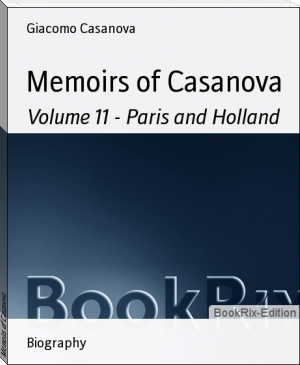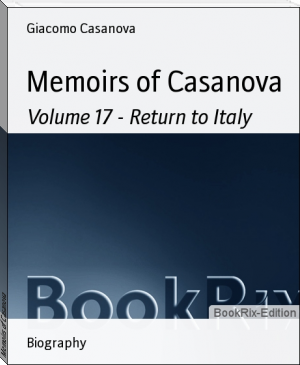The Complete Memoirs of Jacques Casanova de Seingalt by Giacomo Casanova (list of e readers .txt) 📕

- Author: Giacomo Casanova
- Performer: -
Book online «The Complete Memoirs of Jacques Casanova de Seingalt by Giacomo Casanova (list of e readers .txt) 📕». Author Giacomo Casanova
Three or four days afterwards M. Grimani announced the arrival of the bishop, who had put up at the convent of his order, at Saint- Francois de Paul. He presented me himself to the prelate as a jewel highly prized by himself, and as if he had been the only person worthy of descanting upon its beauty.
I saw a fine monk wearing his pectoral cross. He would have reminded me of Father Mancia if he had not looked stouter and less reserved. He was about thirty-four, and had been made a bishop by the grace of God, the Holy See, and my mother. After pronouncing over me a blessing, which I received kneeling, and giving me his hand to kiss, he embraced me warmly, calling me his dear son in the Latin language, in which he continued to address me. I thought that, being a Calabrian, he might feel ashamed of his Italian, but he undeceived me by speaking in that language to M. Grimani. He told me that, as he could not take me with him from Venice, I should have to proceed to Rome, where Grimani would take care to send me, and that I would procure his address at Ancona from one of his friends, called Lazari, a Minim monk, who would likewise supply me with the means of continuing my journey.
"When we meet in Rome," he added, "we can go together to Martorano by way of Naples. Call upon me to-morrow morning, and have your breakfast with me. I intend to leave the day after."
As we were on our way back to his house, M. Grimani treated me to a long lecture on morals, which nearly caused me to burst into loud laughter. Amongst other things, he informed me that I ought not to study too hard, because the air in Calabria was very heavy, and I might become consumptive from too close application to my books.
The next morning at day-break I went to the bishop. After saying his mass, we took some chocolate, and for three hours he laid me under examination. I saw clearly that he was not pleased with me, but I was well enough pleased with him. He seemed to me a worthy man, and as he was to lead me along the great highway of the Church, I felt attracted towards him, for, at the time, although I entertained a good opinion of my personal appearance, I had no confidence whatever in my talents.
After the departure of the good bishop, M. Grimani gave me a letter left by him, which I was to deliver to Father Lazari, at the Convent of the Minims, in Ancona. M. Grimani informed me that he would send me to that city with the ambassador from Venice, who was on the point of sailing. I had therefore to keep myself in readiness, and, as I was anxious to be out of his hands, I approved all his arrangements. As soon as I had notice of the day on which the suite of the ambassador would embark, I went to pay my last farewell to all my acquaintances. I left my brother Francois in the school of M. Joli, a celebrated decorative painter. As the peotta in which I was to sail would not leave before daybreak, I spent the short night in the arms of the two sisters, who, this time, entertained no hope of ever seeing me again. On my side I could not forsee what would happen, for I was abandoning myself to fate, and I thought it would be useless to think of the future. The night was therefore spent between joy and sadness, between pleasures and tears. As I bade them adieu, I returned the key which had opened so often for me the road to happiness.
This, my first love affair, did not give me any experience of the world, for our intercourse was always a happy one, and was never disturbed by any quarrel or stained by any interested motive. We often felt, all three of us, as if we must raise our souls towards the eternal Providence of God, to thank Him for having, by His particular protection, kept from us all the accidents which might have disturbed the sweet peace we were enjoying.
I left in the hands of Madame Manzoni all my papers, and all the forbidden books I possessed. The good woman, who was twenty years older than I, and who, believing in an immutable destiny, took pleasure in turning the leaves of the great book of fate, told me that she was certain of restoring to me all I left with her, before the end of the following year, at the latest. Her prediction caused me both surprise and pleasure, and feeling deep reverence for her, I thought myself bound to assist the realization of her foresight. After all, if she predicted the future, it was not through superstition, or in consequence of some vain foreboding which reason must condemn, but through her knowledge of the world, and of the nature of the person she was addressing. She used to laugh because she never made a mistake.
I embarked from St: Mark's landing. M. Grimani had given me ten sequins, which he thought would keep me during my stay in the lazzaretto of Ancona for the necessary quarantine, after which it was not to be supposed that I could want any money. I shared Grimani's certainty on the subject, and with my natural thoughtlessness I cared nothing about it. Yet I must say that, unknown to everybody, I had in my purse forty bright sequins, which powerfully contributed to increase my cheerfulness, and I left Venice full of joy and without one regret.
End of this Project Gutenberg Etext of MEMOIRES OF JACQUES CASANOVA VENETION YEARS, Vol. 1a, CHILDHOOD by Jacques Casanova de Seingalt
MEMOIRS OF JACQUES CASANOVA de SEINGALT 1725-1798 VENETIAN YEARS, Volume 1b--A CLERIC IN NAPLES
THE RARE UNABRIDGED LONDON EDITION OF 1894 TRANSLATED BY ARTHUR MACHEN TO WHICH HAS BEEN ADDED THE CHAPTERS DISCOVERED BY ARTHUR SYMONS.
A CLERIC IN NAPLES
CHAPTER VIII
My Misfortunes in Chiozza--Father Stephano--The Lazzaretto at Ancona --The Greek Slave--My Pilgrimage to Our Lady of Loretto--I Go to Rome on Foot, and From Rome to Naples to Meet the Bishop--I Cannot Join Him--Good Luck Offers Me the Means of Reaching Martorano, Which Place I Very Quickly Leave to Return to Naples
The retinue of the ambassador, which was styled "grand," appeared to me very small. It was composed of a Milanese steward, named Carcinelli, of a priest who fulfilled the duties of secretary because he could not write, of an old woman acting as housekeeper, of a man cook with his ugly wife, and eight or ten servants.
We reached Chiozza about noon. Immediately after landing, I politely asked the steward where I should put up, and his answer was:
"Wherever you please, provided you let this man know where it is, so that he can give you notice when the peotta is ready to sail. My duty," he added, "is to leave you at the lazzaretto of Ancona free of expense from the moment we leave this place. Until then enjoy yourself as well as you can."
The man to whom I was to give my address was the captain of the peotta. I asked him to recommend me a lodging.
"You can come to my house," he said, "if you have no objection to share a large bed with the cook, whose wife remains on board."
Unable to devise any better plan, I accepted the offer, and a sailor, carrying my trunk, accompanied me to the dwelling of the honest captain. My trunk had to be





Comments (0)